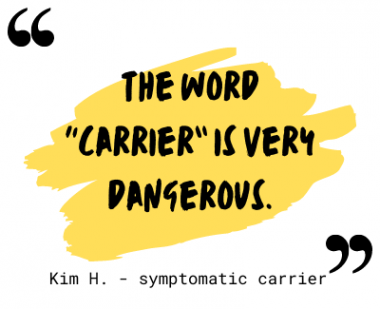What a Symptomatic Hemophilia Carrier Wants Others to Know

What happens when a symptomatic hemophilia carrier needs minor surgery? Will her increased risk of bleeding be recognized?
The story of Kim H. came to my attention on Facebook. She is 39 years old and lives in Pennsylvania. I recently interviewed Kim over Zoom, as her story is important.
Kim is no stranger to hemophilia. According to Kim, her father had severe hemophilia A (factor VIII deficiency) and passed away after a brain aneurysm caused uncontrollable bleeding.
When Kim’s younger sister became pregnant, both women were tested and determined to be carriers of the hemophilia gene. Kim’s hematologist said she was missing 50% of her factor VIII and may experience bleeding issues with surgery. She was labeled a symptomatic carrier. She had heavy periods and joint issues, but no other bleeding problems.
Hemophilia carriers are always women. According to the Hemophilia Federation of America, “Approximately 1/3 of women carrying the hemophilia gene experience bleeding symptoms. Carriers with clotting factors levels of less than 60% of normal may have symptoms similar to a male with mild hemophilia. They are often called symptomatic carriers or are diagnosed with mild hemophilia.”
As Kim’s story illustrates, the label “symptomatic carrier” can be confusing and dangerous. Excerpts of our conversation follow.

Kim H. at home. (Courtesy of Kim H.)
JL: Tell me what happened?
KH: In March, I had a tear in the meniscus ligament in my knee. The plan was to perform laparoscopic surgery for a minor repair. I gave the surgical team a warning that I am prone to heavy bleeding and they might want to get a hematologist on board. My warnings were dismissed.
There was severe heavy bleeding during the surgery. In order to stop the bleeding, they put a massive amount of tourniquet pressure around my knee. They got the bleeding under control. They sent me home.
Three days later, the pain was so severe I was screaming. I was rushed to the hospital, and that is where they discovered a pseudoaneurysm in my knee had ruptured. The pseudoaneurysm was probably caused by the tourniquet pressure used to stop the bleeding during the surgery.
I had been bleeding so much that the pressure in my leg was really bad. I had developed compartment syndrome [extremely painful muscle pressure] in my leg from all of the bleeding. The surgery was 12 hours. Not only did they have to do a bypass to fix the aneurysm, but they also had to do a fasciotomy down my leg to relieve the pressure from compartment syndrome.
How was the next surgery different?
A vascular surgeon was on the team and he listened to me. They had a hematologist guiding them. They saved my leg. They saved my life. They told me I need to start seeing a hematologist regularly because what I experienced wasn’t a minor bleeding issue.
I lost 2.5 liters of blood and spent 32 days in the hospital. I had three surgeries in a week and a half. [The] third surgery helped closed the fasciotomy, but I still have an open wound because my calf was so swollen.
I need a walker to walk. I have a wheelchair. I am very reliant on family members and I may need more surgery. All of this is because of a minor knee repair.

(Graphic by Jennifer Lynne)
What do you want people to know about being a carrier and your experience?
I don’t think many parents realize that if their daughters are [symptomatic] carriers, their daughters are going to have symptoms. A heavy period or bleeding longer from a cut may not seem like a big deal, but when it comes to medical treatment like surgery, it’s a big deal.
The word “carrier” is very dangerous. If I say I am a carrier, people think I just passed down the gene. There is so much more to it with this disorder, and people don’t realize it.
When I was a kid, I was told women could not be hemophiliacs, [as] hemophilia only affects males. I am sitting here now, I’m going no, that’s not accurate, and it’s sad. It is so damaging. This belief that women aren’t affected by hemophilia is still there among the medical community. Doctors look at you like you don’t know what you are talking about, and you are making this up.
***
Kim says the doctors expect her to make a full recovery, but it will be long, and she will require more surgery. She says it will be at least a year before she can think about going back to work. If she could help just one woman by telling her story, she told me it would be worth it.
I wish Kim well in her recovery and thank her for sharing her story.
Note: Hemophilia News Today is strictly a news and information website about the disease. It does not provide medical advice, diagnosis, or treatment. This content is not intended to be a substitute for professional medical advice, diagnosis, or treatment. Always seek the advice of your physician or another qualified health provider with any questions you may have regarding a medical condition. Never disregard professional medical advice or delay in seeking it because of something you have read on this website. The opinions expressed in this column are not those of Hemophilia News Today or its parent company, Bionews, and are intended to spark discussion about issues pertaining to hemophilia.








Leave a comment
Fill in the required fields to post. Your email address will not be published.